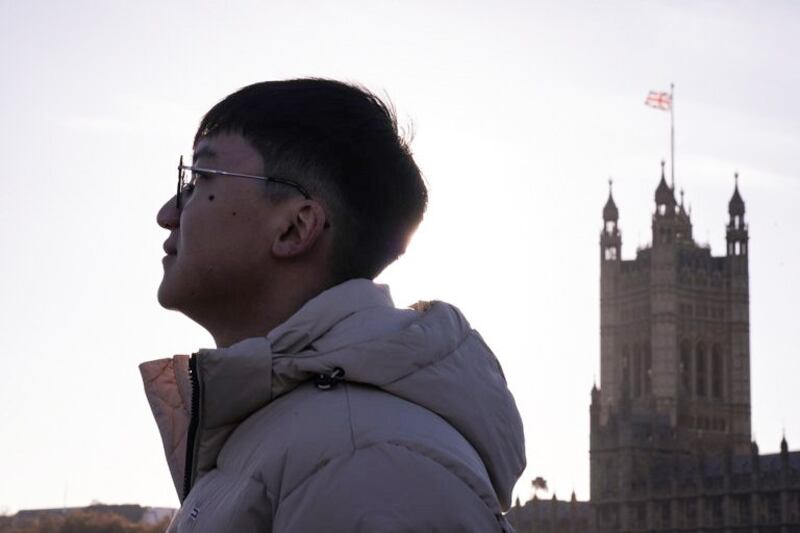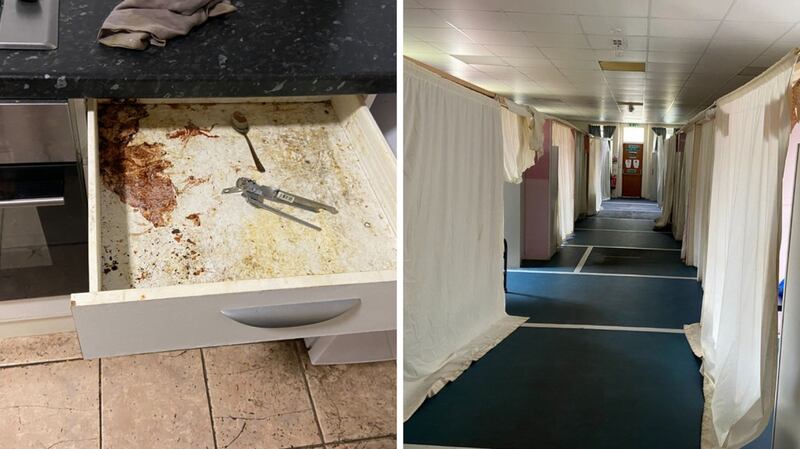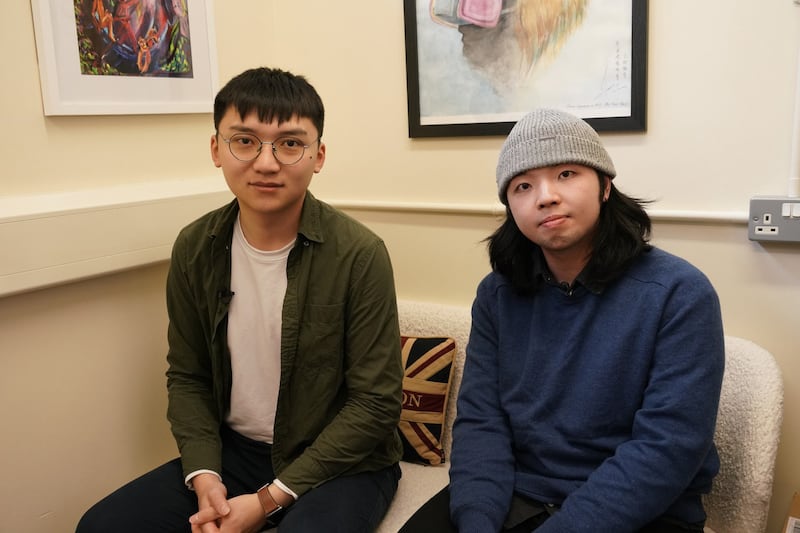Like many asylum-seekers from Hong Kong, Sing first arrived in the United Kingdom two years ago with a large backpack, and very little money in his pocket.
Unlike the affluent families who have been selling their assets and buying new homes in a planned move under the British National Overseas pathway to citizenship, the 25-year-old Sing was forced to rely on the kindness of friends and strangers, and spent the next two years couch-surfing, without knowing how his future would pan out.
Last month, he finally heard that his application had been rejected, plunging him into fear and despair.
"Suddenly, the road ahead was blocked again. I was in pitch black darkness, with no sense of direction," he said of his reaction to the news.
"What would happen next? Would they deport me back to Hong Kong? That was the biggest question," he said.
Sing left Hong Kong without finishing his college degree, and didn't have a good level of English, yet he completed his own application without any legal assistance, he said, adding that this could be a factor in his rejection for refugee status.
He said he simply didn't have the money to hire a lawyer, once he had raised the money for the air ticket to fly to Britain.
Sing isn't the only one finding things tough.
Other Hong Kongers seeking political asylum in the United Kingdom amid a citywide crackdown on public dissent back home described years of uncertainty, a bureaucratic black hole and the stress of terrible accommodation in recent interviews with RFA's Cantonese Service.
'Political factors' prompting departures
A 2022 survey of recent arrivals to the U.K. found that "political factors" were the most significant influence on people's decision to leave Hong Kong, with more than 60% having no intention of going back in the foreseeable future.
While the British government said in September it had received a total of 190,997 applications for its British National Overseas visa, which offers a route to citizenship, not everyone in Hong Kong is eligible.
And some lack the funding to make the move without government assistance, or need to leave in a hurry, with possibly frozen assets.
For those who chose to travel to the U.K. to claim political asylum, the transition to a life free from political persecution has been anything but smooth.
"When I got rejected, I was worried about leaving here," said Sing, who is currently appealing his decision with the help of an immigration lawyer. "I didn't know if I should just go back to Hong Kong and accept the reality that I would be persecuted."
Sing's application was rejected on the basis that the Hong Kong authorities had returned his passport to him after confiscating it, something the immigration officer believed indicates that he will be safe if he goes back there.

His appeal is being supported by a group set up by another asylum-seeker, Isaac Cheng, who was approved as a refugee in February 2022 after a wait of nearly 18 months.
"When I heard the decision, I was able to relax, because it seemed as if I could finally start my new life in the U.K.," Cheng, a former deputy chairman of the Demosisto opposition party, which disbanded when a draconian national security law was imposed on Hong Kong by the ruling Chinese Communist Party from July 2020.
"It means happiness, stability, finally being able to stay, and a sense of security," Cheng said. "Something that doesn't exist in Hong Kong right now."
Refugee conditions
While Sing was able to stay with kind friends and fellow Hong Kongers, not everyone is that lucky. Those who arrive "destitute" are offered accommodation in block-booked hotels, guesthouses and asylum camps in makeshift facilities that often fall far below basic standards of safety and hygiene, with no choice about where they are sent.
"Everything about life in the refugee camp was awful," Hong Kong asylum-seeker Wai told RFA after a stint in an army barracks in the southeastern seaside town of Folkestone. "The conditions are very unsanitary."
"I really couldn't eat any of the food in there," fellow inmate Dobby said. "I survived on bread and eggs."
Refugees are fed three meals a day and given a meager allowance of just £8 (US$10) per week for spending money, barely enough to ride a train into London once a month.
According to Wai and Dobby, refugees were packed into the former army barracks, with up to 20 beds in a room, separated only by hanging sheets. There was no privacy beyond a trip to the shared bathroom.

The floors were sticky and stained with leftover food, melon seed husks and cigarette butts.
"There are no doors; each room is separated by curtains, and people can just push them aside at any time, so there's no privacy or security," Dobby said.
"Other residents drop by to listen to music, talk about their plans, or talk on the phone, so you don't get any rest."
"Even if you get to sleep at night, you can be suddenly woken with a jump," he said. "The psychological pressure makes it hard to sleep, even if you're exhausted."
Impact of life in exile
Like many Hong Kong migrants, Dobby's mental health has suffered in exile, and he is now on antidepressants to ease his symptoms.
"The worst part is, my English isn't good, so there's a language barrier," he said. "I suddenly had to leave the place where I was born, and go somewhere strange. But when I got here, I couldn't work, and had no income."
"On top of that I get assigned to places like that, and there seems to be no news about the status of my application," Dobby said.
Wai and Dobby eventually got out of the barracks with the help of the advocacy group Hong Kong Aid, and Wai has since been granted refugee status.
But the years spent in social isolation have taken a toll.
"We've had no contact with the outside world for two, three years -- how are we supposed to find a job or a place to live just like that?" he said. "[Welfare payments] are enough to eat, get a haircut, and there's a housing allowance ... but it's not enough to rent a house."
Hong Kong Aid said it had handled 40 cases of asylum-seekers between June and mid-December 2023, 15 of which were approved, 11 rejected, and 14 were still pending.
Meanwhile, Cheng has started a support group helping failed asylum-seekers to find lawyers to appeal, which currently has 15 cases in progress – including Sing's.

Cheng and Sing have been carefully studying Sing's rejection letter, and have found its reasoning wanting.
"They think that because I wasn't found guilty and the Hong Kong authorities gave me back my passport that ... I would be safe to go back there," Sing said.
"The reasoning is untenable," Cheng said. "That he isn't at risk because he was able to leave by normal means."
The worst thing is waiting
Asylum-seekers need to jump through several hoops during the application process, including two grueling, face-to-face interviews with immigration officers.
But the worst thing is the waiting, Cheng said.
"When you email them, it takes them a very long time to respond, sometimes a month or two, and they don't reply," he said. "If they want, they can speed up the process, and they can also decide to slow it down."
There are still Hong Kongers waiting for a decision, more than three years after arriving in the country, Cheng said.
"A lot of people were arrested or were present at the [2019] protests, but have no evidence to show their participation," said Cheng, who was a key figure in the pro-democracy movement, and therefore mentioned in reports from the time.
"I was lucky, because there were a lot of articles and publicly available information available online, which I sent to the Home Office, so it was fairly easy for me to get political asylum," he said.
Yet he still feels guilty about his former comrades and fellow democracy activists who didn't leave, and who are now behind bars, including veteran activist Joshua Wong.
"It's really sad, actually," Cheng said. "Hong Kong is often in my dreams, but in nightmarish scenes ... in which I'm trying to think about how to escape, because someone is after me."
Translated by Luisetta Mudie .
